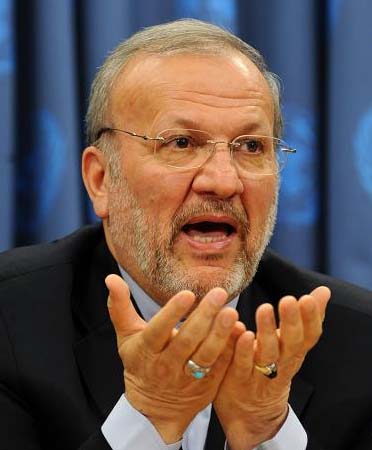Iran invites powers to 'enhanced' high-level talks
Iranian Foreign Minister Manouchehr Mottaki on Thursday characterized the meeting between major powers near Geneva as "constructive" and offered continued dialogue at a "summit" level.
 |
| Iranian Foreign Minister Manouchehr Mottaki Thursday offered continued dialogue at a "summit" level at a press conference in UN. [Xinhua Photo] |
"We have entered into these discussions with this clear agenda, and this dialogue can also be enhanced, both in form and the level of discussions," Mottaki said in Farsi speaking through a translator.
As Mottaki spoke to reporters at the United Nation Headquarters in New York, Iran met with the P5 plus one -- Britain, China, France, Russia, the U.S. and Germany -- at a secluded villa near Geneva.
U.S. Undersecretary of State William Burns and Iran's chief negotiator, Saeed Jalili, held a one-on-one session that lasted roughly 30 minutes, according to media reports.
Mottaki said Iran went into the talks with "a clear agenda and a plan of action" and said there was no mention of halting Iran's nuclear program.
"The issues raised in Geneva were not related to the compromise of Iran's rights in Iran's nuclear program or a moratorium on uranium enrichment," he said, noting that agenda included a variety of security, political and economic issues.
"We are not going to lose any opportunity to address these issues and trying to find comprehensive and holistic solutions," he said.
Tehran considered the atmosphere at the talks "constructive," and hoped that the "other side would also have the same political will and determination," he said.
This year's meeting comes one week after the revelation of a new Iranian uranium enrichment plant near the city of Qom, which will receive an inspection from the International Atomic Energy Agency (IAEA), said Mottaki.
Mohamed ElBaradei of the IAEA recently said Iran violated transparency laws by not informing the UN agency of the plant until Sept. 21, well after its construction began.
But Mottaki said Iran had acted in a transparent way, citing previous guidelines stipulating that the IAEA must be informed of uranium enrichment facilities six months prior to the injection of nuclear material -- a process that has not happened yet at the Qom plant.
"Our work with the agency is transparent," said Mottaki.
But questions of other undisclosed plants have surfaced through media reports. Iran's nuclear chief Ali Akbar Salehi told Iranian television he was preparing a letter for the IAEA on the exact location of the Qom facility "and others," the New York Times quoted on Thursday.
But Mottaki said Iran has declared all its sites to the UN atomic watchdog.
"Whatever Iran has as nuclear sites has been announced to the IAEA and the only case that is under construction is Qom and we also announced that," he said after ducking an earlier question on the matter.
He maintained that Iran would not give up its right to a peaceful nuclear program as a signatory of the Non-Proliferation Treaty.
"Nobody can deny other countries' rights," he said. "Therefore, we are doing everything based on the UN charter and regulations in the IAEA and we have the right to defend the rights of our own nation."
 0
0 







Comments